Related Research Articles

Fatah, formally the Palestinian National Liberation Movement, is a Palestinian nationalist and social democratic political party. It is the largest faction of the confederated multi-party Palestine Liberation Organization (PLO) and the second-largest party in the Palestinian Legislative Council (PLC). Mahmoud Abbas, the President of the Palestinian Authority, is the chairman of Fatah.

Yasser Arafat, also popularly known by his kunya Abu Ammar, was a Palestinian political leader. He was chairman of the Palestine Liberation Organization (PLO) from 1969 to 2004 and president of the Palestinian National Authority (PNA) from 1994 to 2004. Ideologically an Arab nationalist and a socialist, Arafat was a founding member of the Fatah political party, which he led from 1959 until 2004.
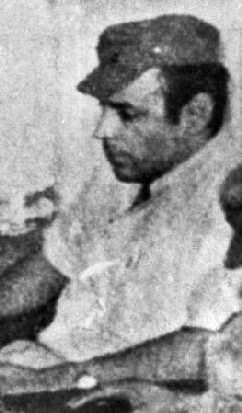
Sabri Khalil al-Banna, known by his nom de guerreAbu Nidal, was a Palestinian militant. He was the founder of Fatah: The Revolutionary Council, a militant Palestinian splinter group more commonly known as the Abu Nidal Organization (ANO). Abu Nidal formed the ANO in October 1974 after a split from Yasser Arafat's Fatah faction within the Palestine Liberation Organization (PLO).
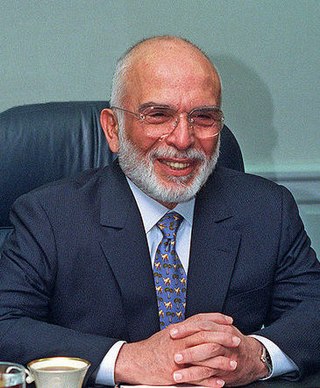
Hussein bin Talal was King of Jordan from 11 August 1952 until his death in 1999. As a member of the Hashemite dynasty, the royal family of Jordan since 1921, Hussein was a 40th-generation direct descendant of the Islamic prophet Muhammad.

The 2003 invasion of Iraq was the first stage of the Iraq War. The invasion began on 20 March 2003 and lasted just over one month, including 26 days of major combat operations, in which a United States-led combined force of troops from the United States, the United Kingdom, Australia and Poland invaded the Republic of Iraq. Twenty-two days after the first day of the invasion, the capital city of Baghdad was captured by coalition forces on 9 April after the six-day-long Battle of Baghdad. This early stage of the war formally ended on 1 May when U.S. President George W. Bush declared the "end of major combat operations" in his Mission Accomplished speech, after which the Coalition Provisional Authority (CPA) was established as the first of several successive transitional governments leading up to the first Iraqi parliamentary election in January 2005. U.S. military forces later remained in Iraq until the withdrawal in 2011.
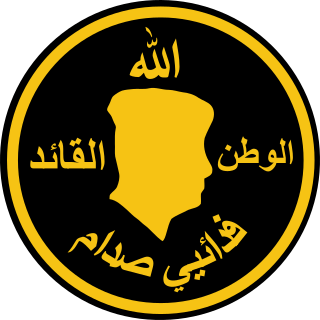
Fedayeen Saddam was a paramilitary Fedayeen organization intensely loyal to the Ba'athist Iraqi government of Saddam Hussein. The name was chosen to mean "Saddam's Men of Sacrifice". At its height, the group had 30,000–40,000 members. The Fedayeen operated completely outside the law, above and outside political and legal structures.
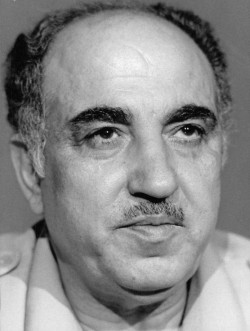
Salah Mesbah Khalaf, also known as Abu Iyad, was a Palestinian militant and the deputy chief and head of intelligence for the Palestine Liberation Organization. He was the second most senior official of Fatah after Yasser Arafat.

Khalil Ibrahim al-Wazir was a Palestinian leader and co-founder of the nationalist party Fatah. As a top aide of Palestine Liberation Organization (PLO) Chairman Yasser Arafat, al-Wazir had considerable influence in Fatah's military activities, eventually becoming the commander of Fatah's armed wing al-Assifa.

Black September, also known as the Jordanian Civil War, was an armed conflict between Jordan, led by King Hussein, and the Palestine Liberation Organization (PLO), led by chairman Yasser Arafat. The main phase of the fighting took place between 16 and 27 September 1970, though certain aspects of the conflict continued until 17 July 1971.

Palestinian political violence refers to actions carried out by Palestinians with the intent to achieve political objectives that can involve the use of force, some of which are considered acts of terror, and often carried out in the context of the Israeli–Palestinian conflict. Common objectives of political violence by Palestinian groups include self-determination in and sovereignty over all of Palestine, or the recognition of a Palestinian state inside the 1967 borders. This includes the objective of ending the Israeli occupation. More limited goals include the release of Palestinian prisoners held by Israel and recognition of the Palestinian right of return.
This article is a chronological listing of allegations of meetings between members of al-Qaeda and members of Saddam Hussein's government, as well as other information relevant to conspiracy theories involving Saddam Hussein and al-Qaeda.

The Battle of Karameh was a 15-hour military engagement between the Israel Defense Forces (IDF) and combined forces of the Palestine Liberation Organization (PLO) and the Jordanian Armed Forces (JAF) in the Jordanian border town of Karameh on 21 March 1968, during the War of Attrition. It was planned by Israel as one of two concurrent raids on PLO camps, one in Karameh and one in the distant village of Safi.

Fatah al-Islam is a Sunni Islamist militant group established in November 2006 in a Palestinian refugee camp, located in Lebanon. It has been described as a militant jihadist movement that draws inspiration from al-Qaeda. It became well known in 2007 after engaging in combat against the Lebanese Army in the Nahr al-Bared UNRWA Palestinian refugee camp. Following its defeat at Nahr el-Bared, the group relocated to the Ain al-Hilweh refugee camp near Sidon in 2008. As of 2014, after the death or capture of many members, most of the surviving members of Fatah al-Islam are thought to have joined other groups in Lebanon and Syria including the Free Syrian Army, Al-Nusra Front, Ahrar al-Sham, and the Islamic State of Iraq and the Levant.

Palestinian fedayeen are militants or guerrillas of a nationalist orientation from among the Palestinian people. Most Palestinians consider the fedayeen to be freedom fighters, while most Israelis consider them to be terrorists.

The Iraqi Popular Army, also known as the People's Army or People's Militia, was a paramilitary and gendarmerie organization composed of civilian volunteers to protect the Ba'ath regime against internal opposition and serve as a counterbalance against any coup attempt by the regular Iraqi Army.

The Battle of Karbala took place during the 2003 invasion of Iraq as U.S. troops fought to take control of the city from Iraqi forces. The city had been bypassed during the advance on Baghdad, leaving American units to clear it in two days of street fighting against Iraqi Saddam Fedayeen Irregular forces.
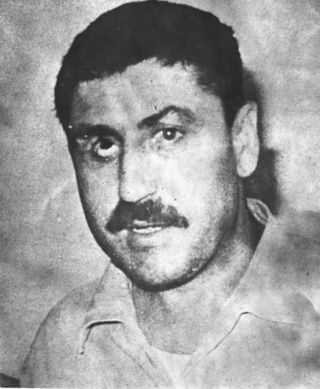
Walid Ahmad Nimr, better known by his nom de guerreAbu Ali Iyad, was a senior Palestinian field commander based in Syria and Jordan during the 1960s and early 1970s.
The terrorist group, self-proclaimed Islamic State (Islamic State of Iraq and Levant also known as Islamic State of Iraq and Syria has committed several fundamental violations of children's rights in the Middle East, particularly in Iraq and Syria The conventions protecting children's rights is the United Nations Convention on the Rights of the Child. This is the most ratified international human rights treaty in history which established the widely supported view that children and young persons have the same basic general human rights as adults and also specific rights that recognize their special needs. A further two additional protocols were adopted by the UN General Assembly on 25 May 2000 covering the involvement of children in armed conflict and on the sale of children, child prostitution and child pornography. In ISIL's rise in the recent years, they have committed various violations of the and its protocols, which have been signed and ratified by Iraq and Syria.

Children in the military are children who are associated with military organizations, such as state armed forces and non-state armed groups. Throughout history and in many cultures, children have been involved in military campaigns. For example, thousands of children participated on all sides of the First World War and the Second World War. Children may be trained and used for combat, assigned to support roles such as porters or messengers, or used for tactical advantage as human shields or for political advantage in propaganda.
The Cubs of the Caliphate referred to a programme by the Islamic State (IS) to recruit and train child soldiers between the ages of 10 and 15. The "Cubs" were active from 2014 to 2017; after this point, the programme was seemingly discontinued as IS-Central's territorial control in Syria and Iraq collapsed. However, systematic child soldier training was revived by IS in 2021/22.
References
- ↑ Philip Seib, Dana M. Janbek: Global Terrorism and New Media: The Post-Al Qaeda Generation, 2010 p.6
- ↑ Peter W. Singer: Facing Saddam’s Child Soldiers. Tuesday, January 14, 2003. Brookings Institution Iraq has also organized several child soldier units. Some of these units fall under the rubric of the Futuwah (Youth Vanguard) movement, a Ba’ath party organ formed in the late 1970s and aimed at establishing a paramilitary organization among children at secondary school level. In this regime-run program, children as young as 12 are organized into units and receive military training and political indoctrination. Units of this force were even pressed into service during the nadir of Iraqi fortunes in the war against Iran (in the mid-1980s). The most important Iraqi child soldier units, though, are the Ashbal Saddam (Saddam Lion Cubs). This is a more recent organization, formed after the defeat in the 1991 Gulf War, when the regime’s hold on power faltered. The Ashbal Saddam involve boys between the ages of 10 and 15, who attend military training camps and learn the use of small arms and infantry tactics. The camps involve as much as 14 hours per day of military training and political indoctrination. They also employ training techniques intended to desensitize the youth to violence, including frequent beatings and deliberate cruelty to animals. The exact numbers of the Ashbal Saddam are not known, but there are an estimated 8,000 members in Baghdad alone.
- ↑ "Facing Saddam's Child Soldiers". Brookings Institution. January 14, 2003.
- ↑ Arab Commando Attacks. By Henry J Taylor. Lewiston Evening Journal, Apr 28, 1969, 3 Daily Press from Newport News, Virginia, April 28, 1969, p.11 Baby Tigers - The State Department finds that such leaders as Arafat, Shukairy and Habeche talk of "fighting for 20 or so years." They even have training camps for 12-year-old youths, a expanding cadre called Baby Tigers.
- ↑ Newsweek - Volume 74, Issues 18-26 - Page 42 - 1969 When Al Fatah opened training camps for 8- to 15-year-old "Lion Cubs" last spring, the response was immediate. Now, on playgrounds of Palestinian refugee camps, Yasir Arafat's young lions— many of them dressed in cut-down combat ...
- ↑ Laffin, John (August 5, 1973). "Fedayeen; the Arab-Israeli Dilemma". Free Press – via Google Books.
- ↑ Arms Control and Disarmament: A Quarterly Bibliography with Abstracts and Annotations, Volume 6. Library of Congress. Arms Control and Disarmament Bibliography. 1969, p.420 ...one unit, the Lion Cubs, for boys ten to fourteen, instills a blood lust by making recruits tear live chickens apart
- ↑ Campbell, R. Keith (August 5, 1987). "Children of the Storm: The Abuse of Children for the Promotion of the Revolution". Lone Tree Publications – via Google Books.
- ↑ Horgan, John; Bloom, Mia (8 July 2015). "This Is How the Islamic State Manufactures Child Militants". VICE News . Vice Media . Retrieved 28 November 2019.